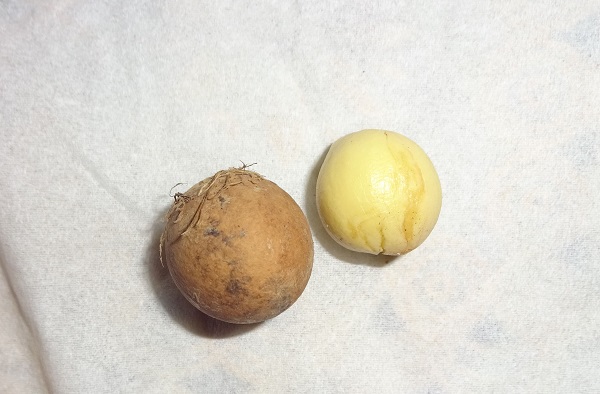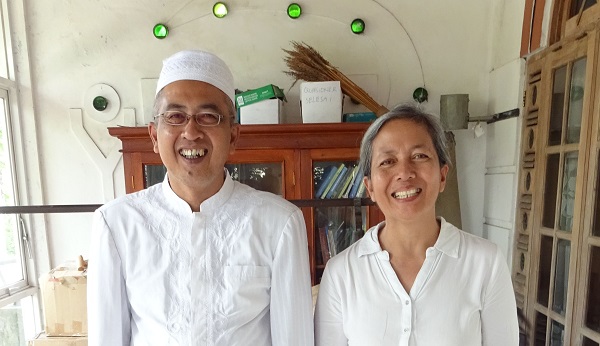A collaboration between a teacher and farmers in Central Java is unlocking the potential of an indigenous biofuel source
Kristina Großmann and Arahmaiani Feisal
Verse 80 of Sura 36 of the Qur’an tells of a green tree out of which fire can be made. It was this sura that inspired Muhammad Djawis Masruri, the leader of the Islamic boarding school Amumarta, near Yogyakarta, to become involved in renewable energy production. Djawis recalled stories from his childhood about the fruits of the region's nyamplung tree (Calophyllum inophyllum) used for lamp oil. People extracted oil from the fruit, poured it into small bamboo tubes then simply added a wick and lit it.
Inspired by the sura and driven to counter global warming, Djawis worked with farmers in the remote Bantul area in the south of Yogyakarta, a region with weak infrastructure but naturally growing nyamplung trees, to gather local knowledge about the potential of the oil it produces.
Working as a cooperative, hundreds of farmers collect the ripe fruits from the tree which they harvest alongside other crops. They deliver the fruit to a nearby factory where the stones are removed, skinned and pressed and the oil purified. Djawis and his team developed and built special machinery for the process. The oil from the nyamplung fruit can be used as fuel for power generators and even cars.
Fossil fuel subsidies linger
For several years, until 2010, the cooperative produced about 100,000 litres of nyamplung oil per month, selling the fuel to a nearby manufacturing company for their energy supply. The contract ended because the relatively high cost of the biofuel at Rp.14,000 (A$1.30) per litre could not compete with the highly subsidised fossil fuels at Rp.7000 per litre. Fossil fuel subsidies have existed in Indonesia since independence in 1949. The current president, Joko Widodo, whose key policy objective on his election in 2014 was the reduction of fuel subsidies, has continued and even increased them in order to keep fuel prices stable. Currently, fuel is subsidised at Rp.500 per litre and this may be increased to approximately Rp.700 to 1000 per litre in the future.

This price differential has been a major obstacle for the business. With the support of current and past students of the Islamic boarding school, Djawis and his team developed a business plan for expanding the production of the biofuel in order to convince the government to provide subsidies and to identify potential investors. Until now, however, negotiations with government have proved unsuccessful and the farmers currently supply only the nearby cosmetic industry with their oil.
Djawis and his team have met with state representatives who, although they showed interest, demanded unacceptable conditions from the cooperative. As Djawis explained, ‘I met the head of the province, the district head and representatives of the Ministry of Energy and Mineral Resources. But their offers in regard to revenues, loans and regulations were so tight that the farmers and I would go bankrupt. At the end, they just wanted to take pictures with me and were not interested in discussing the project any further’. Negotiations with potential private investors were also unsuccessful.
Presidential Decree No. 26/2006 set Indonesia’s renewable energy target at 17 per cent of the total energy mix. However in reality both national and local government processes hamper the development of renewable energy. Moreover, although they subsidise fossil fuels, they are unwilling to support local renewable energy initiatives through subsidies. Djawis explains this reluctance by pointing to the strong connections between politicans and the fossil fuel industry. ‘Many members of parliament have shares in the coal and oil industry – they stick to fossil fuels because they don’t want to lower their profits.’
Sustaining the socio-ecological environment
The production of this biofuel is seen not only as a means of providing the locals with another income stream but also to improve the socio-ecological environment of the region. The nyamplung trees can live and produce fruit for a long period of time and they have deep roots which means they prevent erosion. The trees and surrounding ground retain moisture and contribute to a positive water balance which is important in the dry region of Bantul. People need incentives to stop logging trees and selling off the wood. ‘If people can profit from living trees, they protect them,’ Djawis explains.
With the biofuel business stagnating since 2010, Djawis and his team have looked to alternative uses for the nyamplung, including extracting colour from the skins of the fruits and leaves for dyes in batik production. Already in the prototype stage, the aim is to produce cloth locally then decorate it with locally produced batik colour. ‘To produce batik is easy and provides fast cash in order to bridge the gap until the renewable oil project is established. The farmers need money and advancement now.’
Despite the current lack of support from private investors and governments for local renewable energy production, this initiative offers hope. Djawis and his team are entrepreneurial, innovative, creative and passionate about improving the socio-ecological environment and people's livelihoods, attributes necessary to advance renewable energy production and use in the future.
Dr Kristina Großmann (kristina.grossmann@uni-passau.de) is assistant professor at the Chair of Comparative Development and Cultural Studies at the University of Passau, Germany. Her work is focused on Southeast Asia.
Arahmaiani Feisal is an artist living in Indonesia and working on environmental, social and religious issues.












